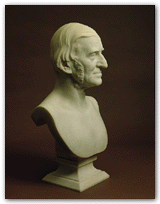Main Menu · Search · Current Issue · Contact · Archives · Centennial · Letters to the Editor · FAQs
![]()
Main Menu · Search · Current Issue · Contact · Archives · Centennial · Letters to the Editor · FAQs
![]()
Rabbit Reread : Chapter & Verse : Off the Shelf : Open Book
![]()
![]()
Emerson Among the Eccentrics: A Group Portrait (Viking, $34.95) is a highly engaging biography of Ralph Waldo Emerson, A.B. 1821, A.M. '27, LL.D. '66, and a portrait of some of his friends. Thus we learn that Henry David Thoreau, A.B. 1837, was handy, "in the old New England sense of knowing how to make things." The Sage of Concord was not, writes the author, the late Carlos Baker, A.M. '33. And he could flub a speech, as he did during Commencement week in 1867. As to carpentry...
This was not a skill in which Emerson himself excelled. About the time of his first acquaintance with Thoreau, and as a respite from composing his address on "The American Scholar," he had stolen a few hours from his study, "getting my nail box set in the snuggest corner of the barn chamber and well filled with nails and gimlet pincers, screw driver, and chisel." In such an operation he found "an old joy of youth, of childhood which perhaps all domestic children share- the cat-like love of garrets, barns, and corn chambers and of the conventions of long housekeeping." But his satisfaction in the neat storage of his tools was not matched by any skill in their use. Later, when Oliver Wendell Holmes questioned him about his manual dexterity, Emerson ruefully answered that he "could split a shingle four ways" with a single nail. And the child Waldo, supervising his father's hoeing in the family potato patch, issued a polite admonition: "I wish you would not dig your leg."
 Holmes was in the audience when Emerson read his Phi Beta Kappa address, "Progress of Culture," at Harvard on July 18, 1867�.The preparation of this address had apparently given Emerson a good deal of trouble. On the eve of its delivery, he had complained that he "could not get the frame even to stand until a late hour." His difficulties were compounded when he began reading. The lighting was so poor that Edward Everett Hale had to hunt up a cushion to bring the pages nearer to the speaker's eyes. James Russell Lowell, who had invited him to make the address, afterward reported that Emerson had "boggled�lost his place�had to put on his glasses; but it was as if a creature from some fairer world had lost his way in our fogs, and it was our fault, not his." Annie Fields, who with her husband had driven out from Boston for the occasion, recalled that "poor Mr. E's MSS. was in inextricable confusion�and the whole matter seemed at first out of joint in the reader's eyes. However that may have been, it was far from out of joint in our eyes, being noble in aim and influence, magnetic, imaginative. I felt grateful that I had lived till that moment and as if I might come home to live and work better. Thank Heaven for such a master!" But Emerson, she added, "was evidently put out and angry with himself for his disorder and, taking Mr. Fields's arm as he came from the assembly, had to be somewhat reassured that it was not an utter failure."
Holmes was in the audience when Emerson read his Phi Beta Kappa address, "Progress of Culture," at Harvard on July 18, 1867�.The preparation of this address had apparently given Emerson a good deal of trouble. On the eve of its delivery, he had complained that he "could not get the frame even to stand until a late hour." His difficulties were compounded when he began reading. The lighting was so poor that Edward Everett Hale had to hunt up a cushion to bring the pages nearer to the speaker's eyes. James Russell Lowell, who had invited him to make the address, afterward reported that Emerson had "boggled�lost his place�had to put on his glasses; but it was as if a creature from some fairer world had lost his way in our fogs, and it was our fault, not his." Annie Fields, who with her husband had driven out from Boston for the occasion, recalled that "poor Mr. E's MSS. was in inextricable confusion�and the whole matter seemed at first out of joint in the reader's eyes. However that may have been, it was far from out of joint in our eyes, being noble in aim and influence, magnetic, imaginative. I felt grateful that I had lived till that moment and as if I might come home to live and work better. Thank Heaven for such a master!" But Emerson, she added, "was evidently put out and angry with himself for his disorder and, taking Mr. Fields's arm as he came from the assembly, had to be somewhat reassured that it was not an utter failure."
Main Menu · Search · Current Issue · Contact · Archives · Centennial · Letters to the Editor · FAQs
![]()
Harvard Magazine · 7 Ware Street · Cambridge, MA 02138 · Phone (617) 495-5746